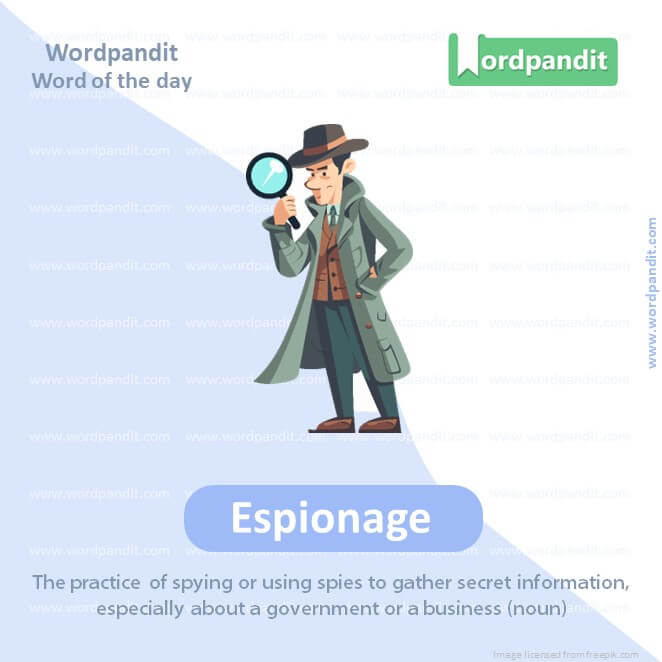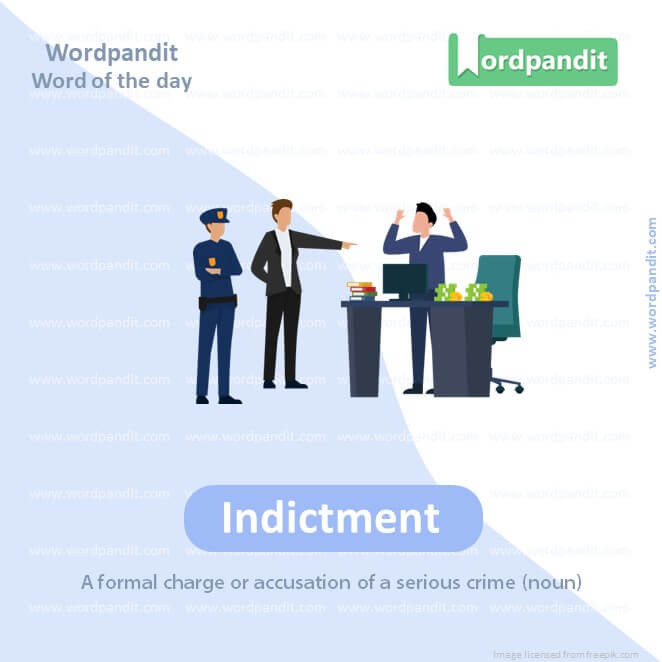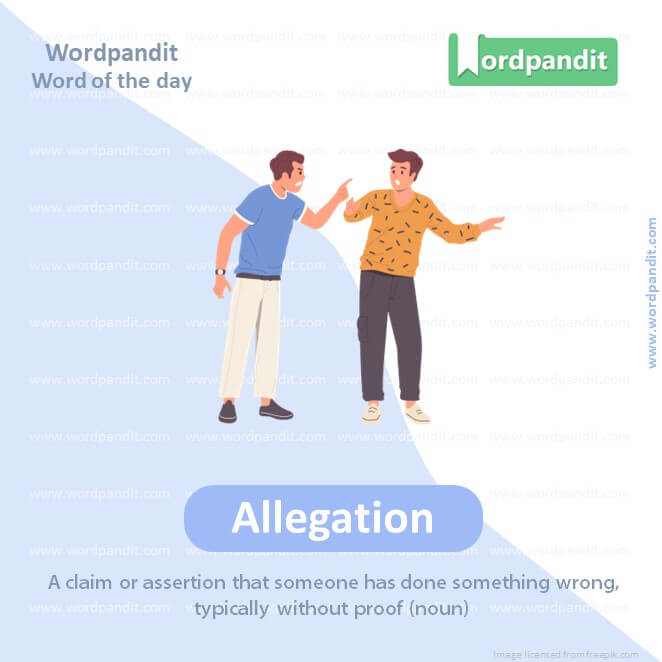Daily Vocabulary Words: List of Daily Used Words
Hi there. Welcome to this special section @ Wordpandit.
Our endeavour here is straightforward: highlighting important daily vocabulary words, you would encounter in The Hindu. This is your repository of commonly used words; essentially, we are posting a list of daily used words. Hence, this has significant practical application as it teaches you words that are commonly used in a leading publication such as The Hindu.
Visit the website daily to learn words from The Hindu.
WORD-1: Shadowy
CONTEXT: In the shadowy world of espionage, intelligence and covert operations, the only rule is to never get caught carrying out a mission. In the more visible world of public diplomacy, the only rule is to never get caught telling a lie or denying what might turn out to be true.
SOURCE: The Hindu
EXPLANATORY PARAGRAPH: Think about when it gets dark and you can’t see things clearly, they look kind of mysterious or scary. That’s what shadowy means. It’s used to describe places or things that are dark and a little bit mysterious or hard to see.
MEANING: Somewhat dark, mysterious, or secretive (Adjective).
PRONUNCIATION: SHA-doh-ee
SYNONYMS: Murky, Mysterious, Obscure, Dim, Shady, Ominous
USAGE EXAMPLE:
1. “They walked down a shadowy alley.”
2. “The room was filled with shadowy corners.”
3. “He had a shadowy past that he never talked about.”
4. “A shadowy figure was lurking near the building.”

WORD-2: Espionage
CONTEXT: In the shadowy world of espionage, intelligence and covert operations, the only rule is to never get caught carrying out a mission. In the more visible world of public diplomacy, the only rule is to never get caught telling a lie or denying what might turn out to be true.
SOURCE: The Hindu
EXPLANATORY PARAGRAPH: Imagine someone playing spy games, sneaking around to find secrets about other people or countries. Espionage is just that – it’s when people secretly gather important information, especially about another country or a competitor.
MEANING: The practice of spying or using spies to gather secret information, especially about a government or a business (Noun).
PRONUNCIATION: ES-pee-oh-nahj
SYNONYMS: Spying, Surveillance, Intelligence, Reconnaissance, Infiltration, Undercover work
USAGE EXAMPLE:
1. “He was charged with espionage for leaking secret documents.”
2. “Espionage played a key role during the Cold War.”
3. “The novel is about espionage and intrigue.”
4. “Companies sometimes use espionage to gain secrets from competitors.”

WORD-3: Covert
CONTEXT: In the shadowy world of espionage, intelligence and covert operations, the only rule is to never get caught carrying out a mission. In the more visible world of public diplomacy, the only rule is to never get caught telling a lie or denying what might turn out to be true.
SOURCE: The Hindu
EXPLANATORY PARAGRAPH: Imagine having a secret clubhouse that no one knows about. Covert is like that. It means something is hidden or secret, not done openly.
MEANING: Not openly acknowledged or displayed, secret (Adjective).
PRONUNCIATION: KOH-vert
SYNONYMS: Secret, Hidden, Undercover, Concealed, Clandestine, Stealthy
USAGE EXAMPLE:
1. “They conducted covert operations behind enemy lines.”
2. “She had a covert plan to surprise her friend.”
3. “The agent was on a covert mission.”
4. “Covert surveillance was used to gather information.”

WORD-4: Indictment
CONTEXT: The recent publication of a United States Department of Justice indictment against an Indian national for targeting wanted Khalistani separatists in North America, at the behest of a government official who may or may not have been acting alone, is as yet an unproven allegation that must stand trial, but is one that has nonetheless cast a dark shadow on New Delhi’s credibility in terms of both covert capacity and public messaging, which must be addressed.
SOURCE: The Hindu
EXPLANATORY PARAGRAPH: Imagine if someone did something wrong, and a group of people decide that they need to explain their actions in court. An indictment is like that. It’s when someone is formally accused of a crime.
MEANING: A formal charge or accusation of a serious crime (Noun).
PRONUNCIATION: in-DITE-ment
SYNONYMS: Accusation, Charge, Allegation, Prosecution, Arraignment, Complaint
USAGE EXAMPLE:
1. “The grand jury issued an indictment against the official.”
2. “His indictment led to a high-profile trial.”
3. “The indictment included several charges of fraud.”
4. “The news reported the indictment of the businessman.”

WORD-5: Behest
CONTEXT: The recent publication of a United States Department of Justice indictment against an Indian national for targeting wanted Khalistani separatists in North America, at the behest of a government official who may or may not have been acting alone, is as yet an unproven allegation that must stand trial, but is one that has nonetheless cast a dark shadow on New Delhi’s credibility in terms of both covert capacity and public messaging, which must be addressed.
SOURCE: The Hindu
EXPLANATORY PARAGRAPH: Think about when your mom or dad asks you to clean your room or do your homework. Behest is a fancy word for an order or command, especially from someone in charge.
MEANING: A command or urgent request (Noun).
PRONUNCIATION: bi-HEST
SYNONYMS: Command, Order, Directive, Instruction, Request, Demand
USAGE EXAMPLE:
1. “At the king’s behest, the knights gathered.”
2. “She organized the event at the behest of her manager.”
3. “The changes were made at the government’s behest.”
4. “He acted at the behest of his superiors.”

WORD-6: Allegation
CONTEXT: The recent publication of a United States Department of Justice indictment against an Indian national for targeting wanted Khalistani separatists in North America, at the behest of a government official who may or may not have been acting alone, is as yet an unproven allegation that must stand trial, but is one that has nonetheless cast a dark shadow on New Delhi’s credibility in terms of both covert capacity and public messaging, which must be addressed.
SOURCE: The Hindu
EXPLANATORY PARAGRAPH: Imagine someone saying that someone else took their toy, but they’re not sure. An allegation is when someone says something happened, but it hasn’t been proven yet. It’s like an accusation or a claim that someone did something wrong.
MEANING: A claim or assertion that someone has done something wrong, typically without proof (Noun).
PRONUNCIATION: al-uh-GAY-shun
SYNONYMS: Accusation, Claim, Charge, Assertion, Complaint, Imputation
USAGE EXAMPLE:
1. “The newspaper published allegations of corruption.”
2. “He denied the allegations against him.”
3. “The court will investigate the allegation of theft.”
4. “There were several allegations of misconduct.”
WORD-7: Apportioning
CONTEXT: Apportioning blame for calamity after a natural disaster is almost impossible, but Indian cities have often tried to ease this decision, and Chennai on December 4 was no exception. Late on December 3, rains began to pummel Chennai as Cyclone Michaung, soon to intensify into a super-cyclonic storm, parked itself roughly 100 km east of the city. By the next morning, most areas had recorded more than 120 mm of rain, with a few recording more than 250 mm.
SOURCE: The Hindu
EXPLANATORY PARAGRAPH: Imagine you have a big chocolate bar, and you break it into pieces to share with your friends. Apportioning is like that. It means dividing something up and giving out the parts to different people.
MEANING: Dividing and distributing portions or shares (Verb).
PRONUNCIATION: uh-POR-shun-ing
SYNONYMS: Dividing, Distributing, Allocating, Sharing, Assigning, Allotting
USAGE EXAMPLE:
1. “The task involved apportioning the funds among various departments.”
2. “They had difficulty apportioning the responsibilities equally.”
3. “Apportioning blame in the situation was not easy.”
4. “The heirs had trouble apportioning the estate’s assets.”
WORD-8: Calamity
CONTEXT: Apportioning blame for calamity after a natural disaster is almost impossible, but Indian cities have often tried to ease this decision, and Chennai on December 4 was no exception. Late on December 3, rains began to pummel Chennai as Cyclone Michaung, soon to intensify into a super-cyclonic storm, parked itself roughly 100 km east of the city. By the next morning, most areas had recorded more than 120 mm of rain, with a few recording more than 250 mm.
SOURCE: The Hindu
EXPLANATORY PARAGRAPH: Think about a really big problem, like a huge storm that knocks down trees or a flood. A calamity is a big disaster or a really bad event that causes a lot of trouble or damage.
MEANING: An event causing great and often sudden damage or distress; a disaster (Noun).
PRONUNCIATION: kuh-LAM-i-tee
SYNONYMS: Disaster, Catastrophe, Tragedy, Misfortune, Crisis, Havoc
USAGE EXAMPLE:
1. “The earthquake was a major calamity for the region.”
2. “They were unprepared for the financial calamity.”
3. “The flood was remembered as the worst calamity of the century.”
4. “He described the war as a calamity for all involved.”
WORD-9: Pummel
CONTEXT: Apportioning blame for calamity after a natural disaster is almost impossible, but Indian cities have often tried to ease this decision, and Chennai on December 4 was no exception. Late on December 3, rains began to pummel Chennai as Cyclone Michaung, soon to intensify into a super-cyclonic storm, parked itself roughly 100 km east of the city. By the next morning, most areas had recorded more than 120 mm of rain, with a few recording more than 250 mm.
SOURCE: The Hindu
EXPLANATORY PARAGRAPH: Imagine you’re hitting a pillow really hard, again and again. Pummel means to hit something or someone many times, usually with your fists.
MEANING: To strike repeatedly, typically with the fists (Verb).
PRONUNCIATION: PUM-uhl
SYNONYMS: Beat, Pound, Thrash, Hammer, Wallop, Batter
USAGE EXAMPLE:
1. “The boxer pummeled his opponent in the ring.”
2. “She pummeled the dough with her fists.”
3. “The storm pummeled the coastline with strong winds.”
4. “He pummeled the punching bag during his workout.”
WORD-10: Singularity
CONTEXT: The figures represent a breathtaking volume of water to be delivered in a single day — and which Tamil Nadu Minister for Municipal Administration K.N. Nehru echoed when he said the city had not received as much rain in seven decades. But that is not the full story. The narratives built around disasters influence the responses to them, and proclamations that attribute a singularity to a natural calamity often feed an unfair line of reasoning in which nature shoulders all the blame.
SOURCE: The Hindu
EXPLANATORY PARAGRAPH: Imagine something so special and different that there’s nothing else like it in the whole world. Singularity means something unique, especially when it’s very unusual or remarkable.
MEANING: The state, fact, or quality of being singularly unique or remarkable (Noun); also refers to a point in space-time where gravitational forces cause matter to have infinite density, as in black holes (Noun).
PRONUNCIATION: sing-gyoo-LAR-i-tee
SYNONYMS for First Meaning: Uniqueness, Individuality, Distinctiveness, Rarity, Exceptionality
SYNONYM: Black hole, Event horizon, Infinity point, Gravitational singularity.
Usage Examples:
1. “His talent for music was a singularity in his family.”
2. “The singularity of her opinion set her apart.”
3. “Scientists study the singularity at the center of black holes.”
4. “The concept of singularity fascinates many in the field of astrophysics.”
Vocabulary PDF
In the digital age, the way we learn languages has transformed dramatically. Among the myriad of resources at our disposal, a ‘vocabulary PDF’ serves as an incredibly effective tool. It offers a structured, accessible and convenient method of enhancing our language skills. To maximize the potential of ‘vocabulary PDF’, it is crucial to understand how to make the most of it.
First off, when venturing through the process of learning with a ‘vocabulary PDF’, maintaining consistent learner engagement is pivotal. This involves regular revision sessions where you consistently go back and refresh your memory about previously learned words. This cyclic process is particularly effective in promoting long-term retention of the vocabulary.
While leveraging a ‘vocabulary PDF’, it’s also beneficial to annotate as you progress. Annotation brings an interactive aspect to your learning, making it dynamic and personalized. Make notes of context, synonyms, antonyms, or even create sentences using the new words. This engagement with the ‘vocabulary PDF’ aids in imbibing the meaning and usage of the words.
Another strategic approach to mastering a ‘vocabulary PDF’ is to utilize a reading aloud technique. Listening to the words as you speak them out loud can stimulate auditory learning, enhancing your pronunciation and comprehension of the vocabulary.
When using a ‘vocabulary PDF’, it is also advantageous to supplement your learning through applications of the new words. Write an essay, engage in a conversation, or post on social media using the new words. This reinforces the acquired vocabulary, augmenting your grasp over them.
In conclusion, a ‘vocabulary PDF’ is a potent instrument that, when harnessed effectively, can significantly bolster your language learning journey. It requires a blend of consistent revision, active annotation, auditory engagement, and practical application. With these strategies in hand, mastering ‘vocabulary PDF’ can be a rewarding and successful experience that fuels your linguistic endeavors.













